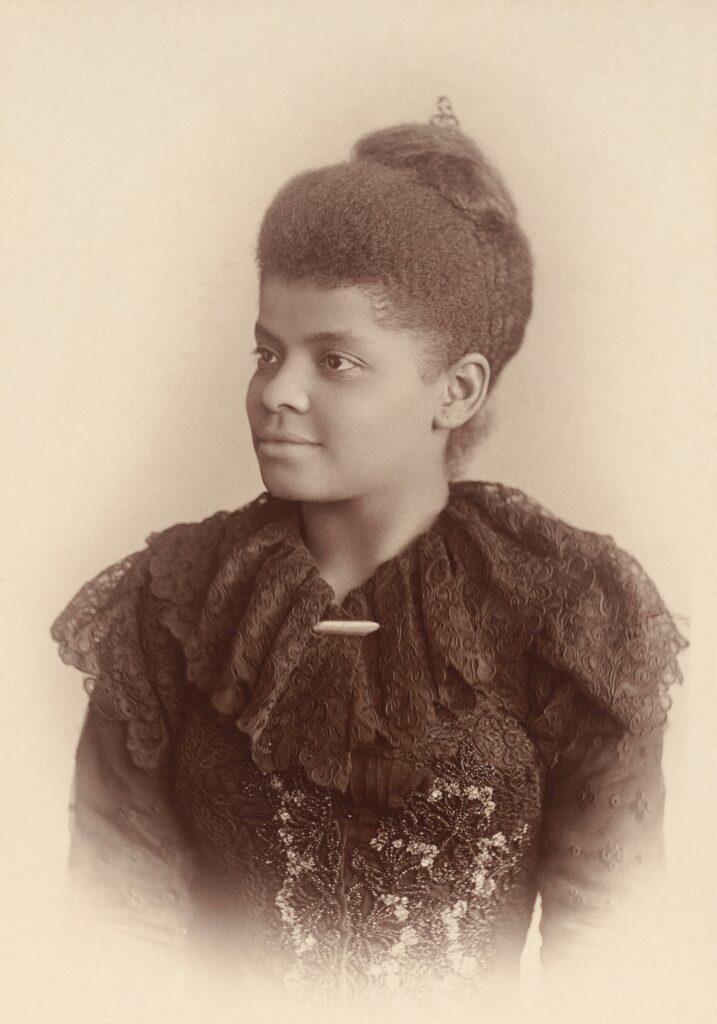HARPER AT 200
IDA B. WELLS-BARNETT
 Journalist and activist Ida B. Wells’s (1862–1931) relentless fight for racial and gender equality rivaled that of Frances Harper, and like Harper, she became a cofounder of the National Association of Colored Women (NACW). Moreover, Wells also openly called out the racism of white women suffragists, emphasizing the rooted problem within the suffrage movement that Harper herself pointed out in her 1866 speech “We Are All Bound Up Together.”
Journalist and activist Ida B. Wells’s (1862–1931) relentless fight for racial and gender equality rivaled that of Frances Harper, and like Harper, she became a cofounder of the National Association of Colored Women (NACW). Moreover, Wells also openly called out the racism of white women suffragists, emphasizing the rooted problem within the suffrage movement that Harper herself pointed out in her 1866 speech “We Are All Bound Up Together.”
Born into slavery in Mississippi, Wells was but the child when the Civil War ended. Her parents took advantage of their rights as free people and were active in the political arena during the Reconstruction. As a girl of 16, Wells suffered an enormous tragedy, losing both parents to the yellow fever epidemic during the late 1870s.
Wells trained as a teacher by attending Shaw University. She eventually found work as a teacher in Memphis, Tennessee, while caring for her orphaned siblings. In Memphis, she became co-owner and contributor to the Memphis Free Speech and Headlight. As a journalist, Wells candidly criticized the false narratives that marked Black men as rapists and justified their lynchings:
Nobody in this section of the country believes the old thread-bare lie that Negro men rape white women. If Southern white men are not careful they will over-reach themselves, and public sentiment will have a reaction; and a conclusion will be reached which will be very damaging to the moral reputation of their women.1
Because Wells implied that Black men and white women’s relations were consensual, she touched a nerve among Southern whites and white paramilitary terrorist groups. Wells’s commitment to truthful journalism and to exposing and challenging white supremacist myths put her own life in danger. She was forced to move to Chicago in 1893 to escape racist violence. There, she married lawyer and fellow journalist and activist Ferdinand L. Barnett and continued her journalistic, activist, and oratorial work.
In spite of the threats to her and her family’s lives, Wells-Barnett never stopped condemning lynchings. As a women’s rights activist, Wells refused to disentangle racial equality from gender equality; as such, she was shunned by white suffragettes, whose actions only proved the insidiousness and divisiveness of racism. Wells went on to be one of the founders of the National Association of Colored Women’s Club (NACWC) the National Association for the Advancement of Colored People (NAACP).
Credits
Written by Samantha de Vera
References
- Ida B. Wells, “Lynch Law in All Its Phases,” Voices of Democracy, accessed October 8, 2024, https://voicesofdemocracy.umd.edu/wells-lynch-law-speech-text/.
